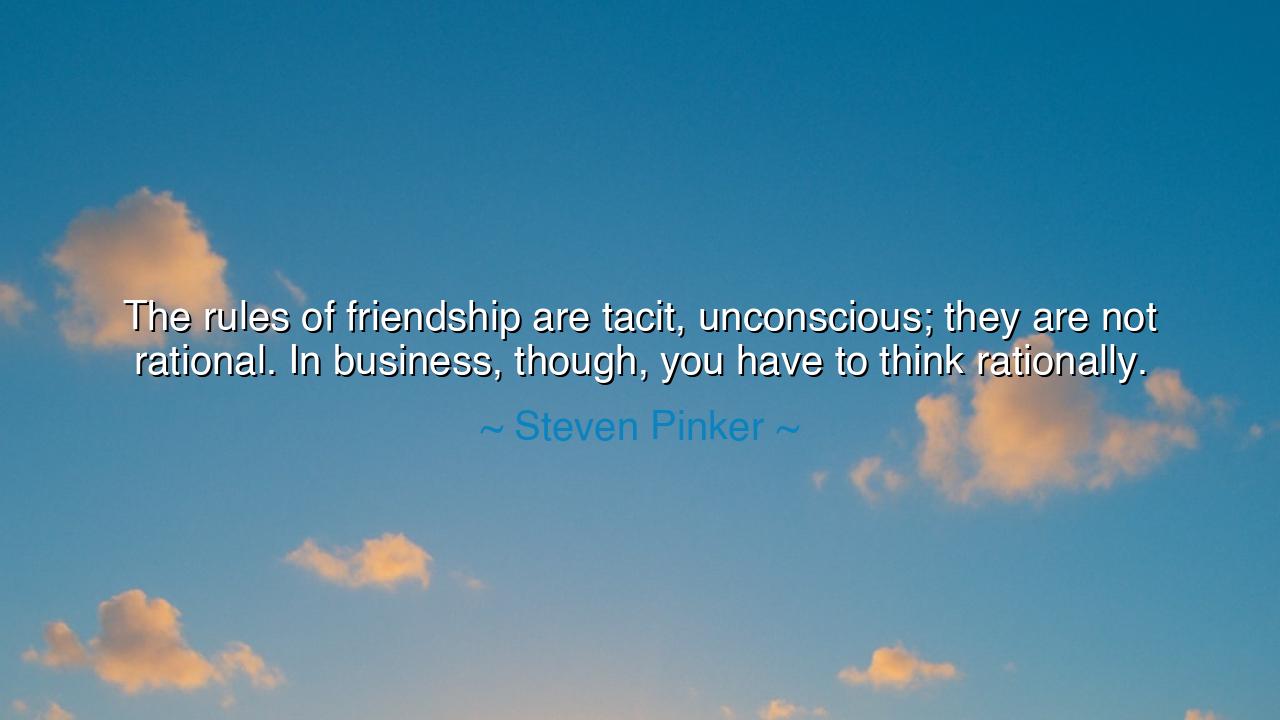
The rules of friendship are tacit, unconscious; they are not
The rules of friendship are tacit, unconscious; they are not rational. In business, though, you have to think rationally.






Hearken, O seekers of wisdom, to the words of Steven Pinker, whose insight illuminates the subtle distinctions between the bonds of the heart and the demands of the marketplace: “The rules of friendship are tacit, unconscious; they are not rational. In business, though, you have to think rationally.” Here lies a profound understanding of human connection and human endeavor, a recognition that friendship is governed by the unspoken currents of trust, loyalty, and shared experience, while commerce and enterprise require reason, calculation, and deliberate strategy.
The origin of this insight lies in the careful observation of human behavior. Unlike transactions in the marketplace, which can be codified, measured, and predicted, the gestures that sustain friendship are subtle, often unconscious, and rarely articulated. A nod of understanding, a timely word of comfort, a shared laughter—all these serve as the invisible scaffolding of companionship. Rationality cannot command these currents, for the heart moves according to a logic older and deeper than calculation, a logic written in empathy, intuition, and mutual regard.
Consider the example of Socrates and Plato, whose bond transcended teacher and pupil, entering the realm of enduring friendship. Their relationship was not defined by rational agreements or contracts, but by shared inquiry, dialogue, and trust. Socrates’ guidance shaped Plato’s mind, and Plato’s loyalty and respect nurtured Socrates’ teachings. The unspoken rules of their companionship—humor, patience, tolerance, and intellectual empathy—were tacit yet inviolable, illustrating the unconscious framework upon which friendship rests.
Pinker’s words further illuminate the contrast between the personal and the transactional. In the marketplace of human affairs—commerce, negotiation, governance—decisions must be weighed with reason, prediction, and prudence. One cannot rely upon intuition or sentiment alone, for the stakes are different: contracts demand clarity, agreements must be enforceable, and actions bear consequences measured in material or strategic terms. Whereas in friendship, to overthink, to rationalize too deeply, risks suffocating the spontaneity and trust that give it life.
History offers further testimony. The friendship of Alexander Hamilton and John Laurens during the American Revolution illustrates this duality. In matters of strategy and statecraft, they reasoned, calculated, and debated with precision. Yet their friendship flourished not because of rational thought, but through unspoken loyalty, courage, and shared ideals. It was in the unconscious understanding between them—trust in moments of peril, encouragement in moments of fear—that their bond became enduring, even as their professional and political decisions required rigorous rationality.
The lesson of Pinker’s insight is thus clear: honor the tacit, intuitive rules of friendship, for these cannot be engineered or coerced. They emerge naturally through presence, empathy, and trust. In contrast, approach work, negotiation, and public action with clarity, calculation, and deliberate thought. Understand that life asks us to navigate both realms: the spontaneous, unmeasured flow of human connection and the structured, rational demands of enterprise. Each has its own rules, its own wisdom, and its own reward.
Practical guidance flows from this wisdom: cultivate friendships with care, presence, and openness, without trying to impose rational frameworks upon them. Listen attentively, act with generosity, and honor trust and loyalty. In professional life, be deliberate, strategic, and principled, separating emotional impulses from decisions that carry material consequences. By doing so, one honors both the human heart and the rational mind, navigating life with skill and compassion.
Thus, remember the teaching of Steven Pinker: friendship thrives in the tacit, unconscious realm, while business and reason demand calculation and strategy. Honor both realms, and you shall find harmony between the life of the heart and the life of action. In recognizing their distinct natures, you wield the power to cultivate bonds that sustain the spirit and to act with wisdom in the affairs of the world.
If you wish, I can also craft a short, rhythmic version suitable for motivational or audio narration, highlighting the emotional resonance of friendship versus the rationality of business. Do you want me to do that?






AAdministratorAdministrator
Welcome, honored guests. Please leave a comment, we will respond soon